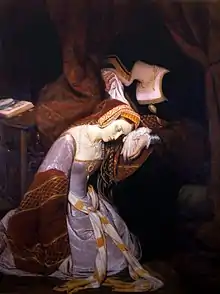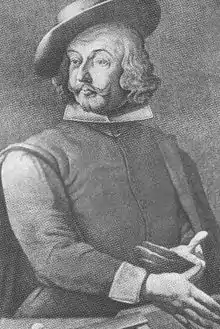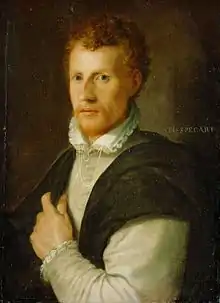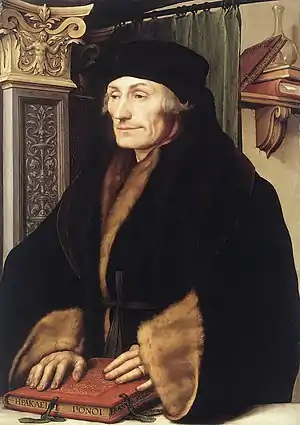1536
Year 1536 (MDXXXVI) was a leap year starting on Saturday (link will display the full calendar) of the Julian calendar.
| Millennium: | 2nd millennium |
|---|---|
| Centuries: | |
| Decades: | |
| Years: |
| 1536 by topic |
|---|
| Arts and science |
| Leaders |
|
| Birth and death categories |
| Births – Deaths |
| Establishments and disestablishments categories |
| Establishments – Disestablishments |
| Works category |
|
| Gregorian calendar | 1536 MDXXXVI |
| Ab urbe condita | 2289 |
| Armenian calendar | 985 ԹՎ ՋՁԵ |
| Assyrian calendar | 6286 |
| Balinese saka calendar | 1457–1458 |
| Bengali calendar | 943 |
| Berber calendar | 2486 |
| English Regnal year | 27 Hen. 8 – 28 Hen. 8 |
| Buddhist calendar | 2080 |
| Burmese calendar | 898 |
| Byzantine calendar | 7044–7045 |
| Chinese calendar | 乙未年 (Wood Goat) 4232 or 4172 — to — 丙申年 (Fire Monkey) 4233 or 4173 |
| Coptic calendar | 1252–1253 |
| Discordian calendar | 2702 |
| Ethiopian calendar | 1528–1529 |
| Hebrew calendar | 5296–5297 |
| Hindu calendars | |
| - Vikram Samvat | 1592–1593 |
| - Shaka Samvat | 1457–1458 |
| - Kali Yuga | 4636–4637 |
| Holocene calendar | 11536 |
| Igbo calendar | 536–537 |
| Iranian calendar | 914–915 |
| Islamic calendar | 942–943 |
| Japanese calendar | Tenbun 5 (天文5年) |
| Javanese calendar | 1454–1455 |
| Julian calendar | 1536 MDXXXVI |
| Korean calendar | 3869 |
| Minguo calendar | 376 before ROC 民前376年 |
| Nanakshahi calendar | 68 |
| Thai solar calendar | 2078–2079 |
| Tibetan calendar | 阴木羊年 (female Wood-Goat) 1662 or 1281 or 509 — to — 阳火猴年 (male Fire-Monkey) 1663 or 1282 or 510 |
| Wikimedia Commons has media related to 1536. |

May 19: Execution of Anne Boleyn.
Events

February 25: Jacob Hutter is burned at the stake.
January–June
- January – Henry VIII of England suffers a leg injury during a jousting tournament.
- January 6 – The Colegio de Santa Cruz de Tlatelolco, the oldest European school of higher learning in the Americas, is established by Franciscans in Mexico City.
- January 7 – Catherine of Aragon, first queen of Henry VIII of England, dies aged 50 in banishment at Kimbolton Castle in England, holding to the last that she is the country's only rightful queen.
- January 22 – John of Leiden, Bernhard Knipperdolling and Bernhard Krechting are executed in Münster for their roles in the Münster Rebellion.
- February 2 – Spaniard Pedro de Mendoza founds Buenos Aires, Argentina.
- February 18 – A Franco-Ottoman alliance exempts French merchants from Ottoman law and allows them to travel, buy and sell throughout the sultan's dominions, and to pay low customs duties on French imports and exports. The compact is confirmed in 1569.
- February 25 – Tyrolean Anabaptist leader Jacob Hutter, founder of the Hutterites, is burned at the stake in Innsbruck for heresy.
- March – The Italian War of 1536–1538 resumes between Francis I of France and Charles V, Holy Roman Emperor. Francis seizes control of Savoy, and captures Turin. Charles triumphally enters Rome, following the Via Triumphalis, and delivers a speech before the Pope and College of Cardinals, publicly challenging the king of France to a duel.
- April – An Acte for Laws & Justice to be ministred in Wales in like fourme as it is in this Realme further incorporates the legal system of Wales into that of England.[1]
- April 6 – Count's Feud: Malmø surrenders to King Christian III of Denmark.
- April 14 – The Reformation Parliament in England passes an Act for the Dissolution of the Monasteries.[2] Religious houses closed as part of Henry VIII's dissolution include: Basingwerk Abbey, Bourne Abbey, Brinkburn Priory, Buildwas Abbey, Cartmel Priory, Dorchester Abbey, Dore Abbey, Haltemprice Priory, Keldholme Priory and Tintern Abbey.
- April 30 – The Inquisition is implemented in Portugal.
- May 2 – Anne Boleyn, second queen of Henry VIII of England, is arrested on the grounds of incest, adultery and treason.
- May 6 – Incan emperor Manco Inca Yupanqui, having on April 18 escaped from imprisonment in Cuzco, begins his revolt against his captors, when his army begins the 10-month Siege of Cuzco against a garrison of Spanish conquistadors and Indian auxiliaries, led by Hernando Pizarro.
- May 14 – Thomas Cranmer declares Henry VIII of England's marriage to Anne Boleyn to be null and void.
- May 17 – The five men accused of adultery with Anne Boleyn, including her own brother George Boleyn, are executed.
- May 19 – Anne Boleyn, queen consort of Henry VIII of England, is executed in the Tower of London.
- May 30 – Henry VIII of England marries Jane Seymour.
- June 24 – San Juan Bautista del Teul is founded by Cristóbal de Oñate in New Spain.
- June 26 – Spanish navigator Andrés de Urdaneta and a few companions arrive in Lisbon from the Maluku Islands, completing a westabout circumnavigation which began with the Loaísa expedition of 1525.
- June 27 – San Pedro Sula is founded by Pedro de Alvarado in Honduras.
July–December
- July 29 – Count's Feud ends when Copenhagen surrenders to King Christian III of Denmark. On August 6 he marches into the city and on August 12 arrests the country's bishops, thus consolidating the Protestant Reformation in Denmark.
- August 5 – Guelders Wars: Battle of Heiligerlee – Danish allies of Charles II, Duke of Guelders, under command of Meindert van Ham, are defeated by Habsburg forces under Georg Schenck van Toutenburg in the Low Countries.
- August 10 – Francis III, Duke of Brittany, Dauphin of France, dies having caught a chill after a game of tennis which has developed into a fever; under torture Sebastiano de Montecuccoli, his Italian secretary, confesses to poisoning him and is brutally executed on October 7. Francis' younger brother, Henry, Duke of Orléans, succeeds as heir to the kingdom.
- October 1–December 5 – The Pilgrimage of Grace, a rebellion in England against Henry VIII's church reforms,[2] beginning as the Lincolnshire Rising and spreading to Yorkshire, from where it is led by Robert Aske.
- October 6 – English Bible translator William Tyndale is burned at the stake in Vilvoorde, Flanders.[2]
Date unknown
- John Calvin's Institutes of the Christian Religion, a seminal work of Protestant systematic theology, is published in Basel.[3]
- Battle of Reynogüelén: Spanish conquistadors defeat a group of Mapuches in Chile, during the expedition of Diego de Almagro.
- Battle of Un no Kuchi: Takeda Family forces defeat Hiraga Genshin.
Births
- January 22 – Philibert, Margrave of Baden-Baden (d. 1569)
- February 2
- Scévole de Sainte-Marthe, French poet (d. 1623)
- Piotr Skarga, Polish writer (d. 1612)
- February 12 – Leonardo Donato, Doge of Venice (d. 1612)
- February 24 – Pope Clement VIII (d. 1605)[4]
- March 6 – Santi di Tito, Italian painter (d. 1603)
- March 10 – Thomas Howard, 4th Duke of Norfolk, English politician (d. 1572)
- March 31 – Ashikaga Yoshiteru, Japanese shōgun (d. 1565)
- April 8 – Barbara of Hesse (d. 1597)
- May 3 – Stephan Praetorius, German theologian (d. 1603)
- May 13 – Jacobus Pamelius, Belgian bishop (d. 1587)
- August 10 – Caspar Olevian, German Protestant theologian (d. 1587)
- August 14 – René, Marquis of Elbeuf (d. 1566)
- October 18 – William Lambarde, English antiquarian, writer on legal subjects, politician (d. 1601)
- October 21 – Joachim Ernest, Prince of Anhalt (d. 1586)
- October 28 – Felix Plater, Swiss physician (d. 1614)
- November 11 – Marcantonio Memmo, Doge of Venice (d. 1615)
- November 22 – Johann VI, Count of Nassau-Dillenburg (d. 1606)
- December 26 – Yi I, Korean Confucian scholar (d. 1584)
- December 29 – Henry VI, Burgrave of Plauen (d. 1572)
- date unknown
- Juan de Fuca, Greek maritime pilot (d. 1602)
- Jeong Cheol, Korean administrator and poet (d. 1593)
- Thomas Sackville, 1st Earl of Dorset, English statesman and poet (d. 1608)
- Leonor de Cisneros, Spanish Protestant (d. 1568)
- Lord Guildford Dudley, English nobleman (executed 1554)
- Roger Marbeck, chief physician to Elizabeth I of England (d. 1604)
- Charles Howard, 1st Earl of Nottingham, English statesman and admiral (d. 1624)
- Friedrich Sylburg, German classical scholar (d. 1596)
- Ikeda Tsuneoki, Japanese military commander (d. 1584)
Deaths
- January 6 – Baldassare Peruzzi, Italian architect and painter (b. 1481)
- January 7 – Catherine of Aragon, First Queen of Henry VIII of England (b. 1485)
- January 22
- John of Leiden, Anabaptist leader from the Dutch city of Leiden (b. 1509)
- Bernhard Knipperdolling, German religious leader (b. c. 1495)
- February 25
- Berchtold Haller, German-born reformer (b. 1492)
- Jacob Hutter, Tyrolean founder of the Hutterite religious movement (burned at the stake)
- March 1 – Bernardo Accolti, Italian poet (b. 1465)
- March 15 – Pargali Ibrahim Pasha, Ottoman grand vizier (b. 1493)
- April 4 – Frederick I, Margrave of Brandenburg-Ansbach (b. 1460)
- May 17 – George Boleyn, 2nd Viscount Rochford, English diplomat (executed) (b. 1503)
- May 19 – Anne Boleyn, second queen of Henry VIII of England (executed) (b. c. 1501/1507)
- May 31 – Charles I, Duke of Münsterberg-Oels, Count of Kladsko, Governor of Bohemia and Silesia (b. 1476)
- June 29 – Bernhard III, Margrave of Baden-Baden (b. 1474)
- July 12 – Erasmus, Dutch philosopher (b. 1466)
- July 23 – Henry FitzRoy, 1st Duke of Richmond and Somerset, illegitimate son of Henry VIII of England (b. 1519)
- June 28 – Richard Pace, English diplomat (b. 1482)
- August 10 – Francis III, Duke of Brittany, Dauphin of France, brother of Henry II (b. 1518)
- September 25 – Johannes Secundus, Dutch poet (b. 1511)
- September 26 – Didier de Saint-Jaille, 46th Grandmaster of the Knights Hospitaller
- September 27 – Felice della Rovere, also known as Madonna Felice, was the illegitimate daughter of Pope Julius II (b. 1483)
- October 6 – William Tyndale, English Protestant Bible translator (b. c. 1494)
- October 14 – Garcilaso de la Vega, Spanish poet (b. 1503)
- December 21 – Sir John Seymour, English courtier (b. 1474)
- date unknown
- Hector Boece, Scottish philosopher (b. 1465)
- Cecilia Gallerani, principal mistress of Ludovico Sforza, Duke of Milan (b. 1473)
- Hiraga Genshin, Japanese retainer and samurai
- John Rastell, English printer and author
- Jacques Lefèvre d'Étaples, French theologian and humanist (b. c. 1450)
References
- Palmer, Alan; Palmer, Veronica (1992). The Chronology of British History. London: Century Ltd. pp. 145–148. ISBN 0-7126-5616-2.
- Williams, Hywel (2005). Cassell's Chronology of World History. London: Weidenfeld & Nicolson. pp. 210–215. ISBN 0-304-35730-8.
- "John Calvin". Christian History. Christianity Today International. August 8, 2008. Retrieved December 15, 2013.
- "Clement VIII | pope". Encyclopedia Britannica. Retrieved January 14, 2021.
This article is issued from Wikipedia. The text is licensed under Creative Commons - Attribution - Sharealike. Additional terms may apply for the media files.


